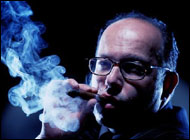No Proven Programs to Help Teens Quit Smoking
A large new review of studies on teen-age smoking finds there is no solid evidence about how to help adolescents kick the habit once they have started.
Because one-third of smokers take their first cigarette at age 14 and almost 90 percent before age 21, most previous studies of youth tobacco use have concentrated on prevention, not cessation.
“There is not yet sufficient evidence to test the effectiveness of smoking-cessation programs for adolescents, although some approaches show promise,” according to review authors led by Gill Grimshaw at the University of Warwick in Coventry, England.
The review appears in the latest issue of The Cochrane Library, a publication of The Cochrane Collaboration, an international organization that evaluates medical research. Systematic reviews like this one draw evidence-based conclusions about medical practice after considering both the content and quality of existing medical trials on a topic.
To make things more complicated, researchers suspect that teenage smokers are anything but mirror images of their adult counterparts. “They may be addicted, but perhaps not as addicted, pharmacologically, (as adults),” said Jonathan Winickoff, M.D., an assistant professor of pediatrics at Harvard Medical School. 
Genetic factors also play a role, he said, and researchers may someday gain a greater understanding of them. “In the future, what we might see is more tailoring of approaches, given what the underlying genetic predisposition to addiction is.”
As a result, nicotine-replacement approaches may not work as well in teens, said Winickoff, chair of the American Academy of Pediatrics Tobacco Consortium.
In the Cochrane Library review, a team of researchers searched for studies that examined the effects of smoking-cessation approaches on teens. They found 15 studies, covering 3,605 adolescents, that met their criteria.
Two studies looked at nicotine-replacement treatments, including patches and gum, but the reviewers report that the research failed to show an effect when compared to placebo.
For now, there is insufficient evidence to show that those treatments work in adolescents, the reviewers wrote.
Nine studies tried to motivate teens to stop smoking through a variety of means, but the results were mixed.
Some studies looked at quitting over a period of a single week. The reviewers wrote that brief vacations from smoking could be a good thing because they allow teens to practice quitting or “interrupt the progression to more regular or heavy smoking.” Still, the reviewers wrote, those are only assumptions without any data to back them up.
According to Winickoff, the review suggests that “there are probably some cessation programs for adolescents that work. But we don’t know which ones are most effective for each teenager.”
The reviewers say that complex programs seem to work the best because they are “designed to respond to the many issues that characterize young persons’ smoking.”
Even so, the evidence is not strong enough to recommend widespread implementation of any model, the reviewers say, especially considering that there’s no research into whether the approaches prevent teens from smoking again later in life.
The reviewers call for further research, and they note that several studies are under way. But finding participants can be a challenge, since parents must give permission in some cases for the kids to be studied.
“There are sensitivities about blowing the young person’s cover by (allowing) their participation in a quitting program,” said review co-author Gill Grimshaw, a researcher at the University of Warwick in the United Kingdom. In other words, parents might learn that their kids smoke when they see a consent form.
There is hope, though, in the fact that “a lot of teens have extreme ambivalence about whether they want to continue smoking,” said Winickoff. “This ambivalence provides a tremendous opportunity to help them quit.”
Finally, research suggests that some of the most crucial players in the smoking habits of teenagers are close to home - their moms and dads. “We know that one way to help youth quit and not initiate smoking is to help parents quit,” Winickoff said.
Grimshaw GM, Tobacco cessation interventions for young people. The Cochrane Database of Systematic Reviews 2006, Issue 4.
Source: Health Behavior News Service
Revision date: June 18, 2011
Last revised: by Janet A. Staessen, MD, PhD